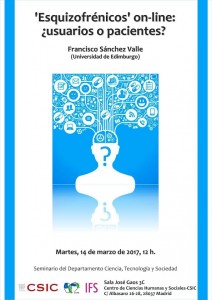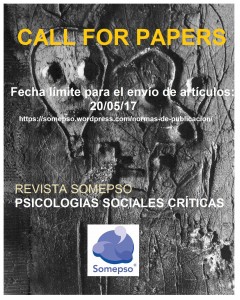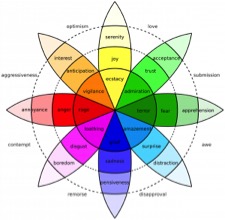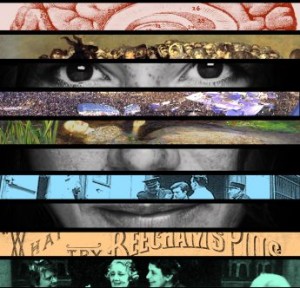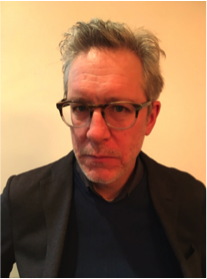Seminario organizado por el Departamento CTS del CSIC
A cargo de Francisco Sánchez Valle (Universidad de Edimburgo)
14 de Marzo a las 12:00h
Resumen:
En este seminario me propongo analizar el papel de las Tecnologías de Internet en los procesos de ‘identificación’. Específicamente, mi interés gira en torno a la co-producción de: 1) pacientes diagnosticados como ‘esquizofrénicos’ por parte de la psiquiatría clínica, y 2) apps diseñadas y dirigidas a estos sujetos con el fin de obtener una mejor gestión de sus propias enfermedades mediante el reconocimiento y monitorización de sus estados mentales.
En la llamada Cultura en Red o Cibercultura, las tecnologías de Internet han proporcionado un nuevo espacio para la negociación de los procesos de identificación. Estos procesos han sido abordados desde diferentes puntos de vista y disciplinas, con especial énfasis en el rol de las Redes Sociales y los Juegos Online. Sin embargo, la proliferación de las llamadas “identidades virtuales” y con ello el debate en torno a la dicotomía online/ offline self, ha permeado al campo de la Salud. En los últimos años, el uso de los dispositivos de comunicación móviles, junto con el desarrollo de las infraestructuras de la comunicación, han propiciado la transmisión, recopilación y evaluación de datos relativos a los servicios de la salud así como la monitorización de pacientes en tiempo real (Mobile Health). En el caso de la Salud Mental, aquellos pacientes diagnosticados como ‘esquizofrénicos’ tienen la posibilidad de acceder a la Red a través de aplicaciones móviles específicamente diseñadas para el automanejo emocional con el objetivo de conocer comportamientos pasados y anticipar así comportamientos futuros.
En esta línea, y desde un enfoque interdisciplinar – en la intersección entre los Disability Studies, la Sociología de la Diagnosis y los Estudios Sociales de Internet – pretendo analizar la relación dialéctica existente entre las identificaciones externas producidas por la psiquiatría clínica y la capacidad agencial de estos usuarios/pacientes para producir auto-identificaciones capaces de impugnar dichas categorías a través de estas prácticas tecnológicamente mediadas. Para ello expondré el caso de una de estas Tecnologías de la Asistencia: Clin Touch, una app para dispositivos móviles dirigida a ayudar a personas con psicosis.
El trabajo que expongo en este seminario es el punto de partida para el futuro desarrollo de mi tesis doctoral en el que abordaré no sólo el papel de la tecnología en los procesos de identificación por parte de un particular grupo de agentes etiquetados como ‘enfermos mentales’, sino también las consecuencias sociales asociadas tanto para estos usuarios/pacientes como para la propia práctica de la Salud Mental.
